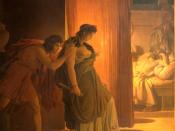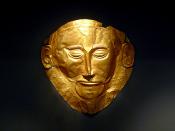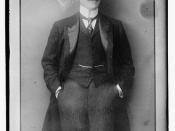The guy gets the girl. The poor man wins the lottery. The orphan gets a home. They lived happily ever after. Americans are so used to endings that provide closure and warm, fuzzy feelings, that it is difficult to understand the appeal of a tragic ending. For the Greeks, the ending that does not provide that same satisfaction as the "happy ending" is what brings them back for more. In a society so engaged in the theater and the arts, those endings that are left open to interpretation, or those that provoke emotions of shock and pity, are the sequel setups and movie trailers of our society today.
Different facets of Greek society appear in their fine arts, and the people enjoyed seeing their everyday lives portrayed on stage. The lives of the Greeks were not entirely "happy," and therefore the scenes that depicted their lives as flawed characters are not what present-day Americans call "happy" either.
Tragic endings frequently occurred in real life; brothers would feud and ultimately one would prevail, causing harm and suffering to his brother and the family. This endless cycle of tragedy in Greek society was not the only way of life, but it is an important aspect of their ancient culture. What appeared on the stage accurately illustrated certain parts of everyday life, while also adding the drama that excites the audience to this day. These bits of drama that were fused with reality included appearances of the gods, miracles, oracles, over-exaggeration and larger-than-life heroes.
One such hero, the great king Agamemnon, is a tragic hero with the undesired fate that causes Americans to shudder. In the Aeschylus' tragedy Agamemnon, the title character is forced to sacrifice his own daughter for good fortune in war. When he returns home from the horrors of war...


